 Lauren Michele Jackson
Lauren Michele Jackson
Ruth Negga and Tessa Thompson star in Rebecca Hall’s version of the 1929 novel.
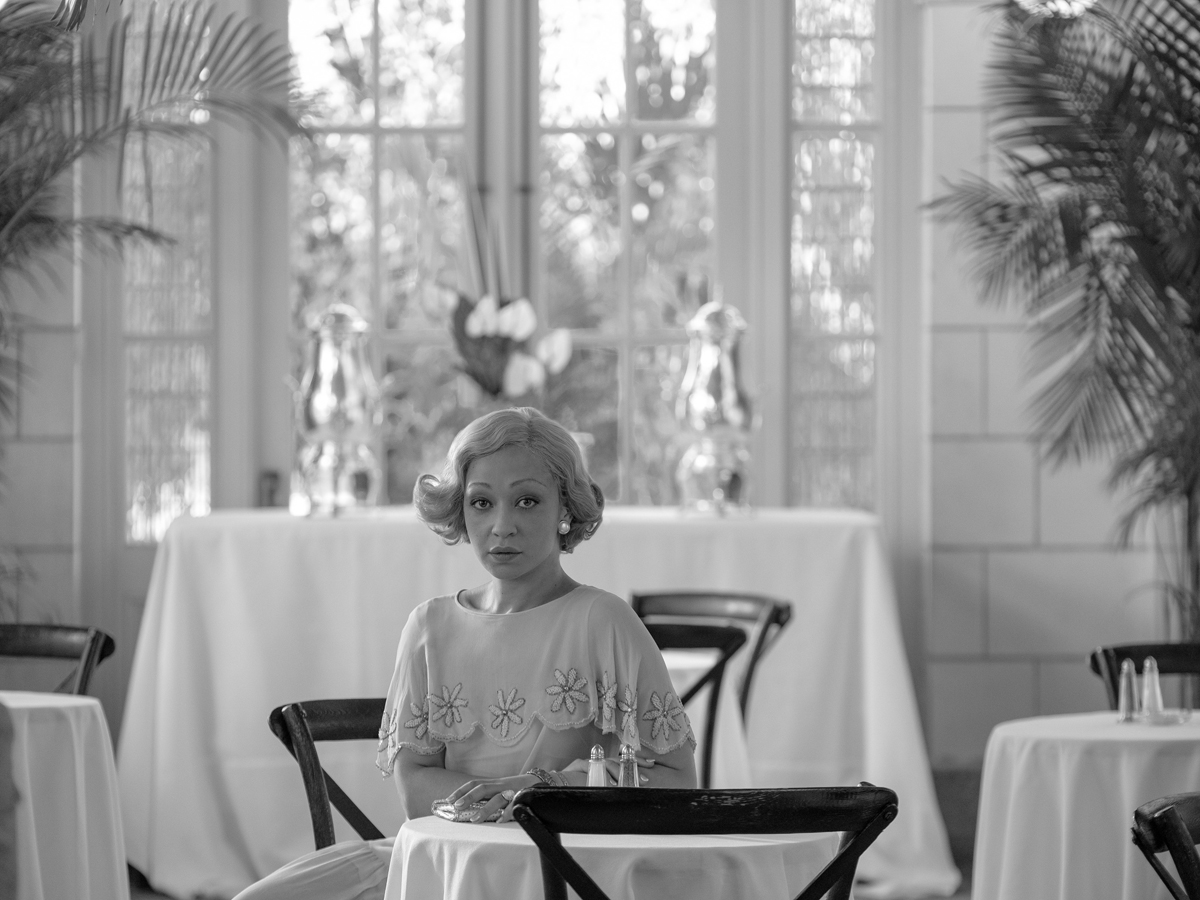
Ruth Negga as Clare in Passing. Netflix © 2021.
Passing, written and directed by Rebecca Hall, now playing in select theaters and available on Netflix beginning November 10, 2021
• • •
Things begin in the thick heat of a New York summer. A woman armed with the day’s shopping seeks refuge in a glass of tea. And she will find it—the tea, that is—but first there will be an encounter. She steps into the cooling air of the Drayton Hotel, the sort of place where whiteness flourishes, equal parts stuffy and wanton. The shopper is hardly settled before she’s ensnared by the impertinent stare of a blonde woman seated across the dining room. The other woman rises, begins to approach. The shopper stands—oh dear, she’s truly caught—and makes to leave, but it’s too late. The blonde’s honeyed voice halts the panicked shopper: “Pardon me. I don’t mean to stare, but I think I know you.” And so, it seems, she does. But—with a slow smile, she tilts her head slightly and, holding her gaze steady, asks, “Don’t you know me?” It is begun.
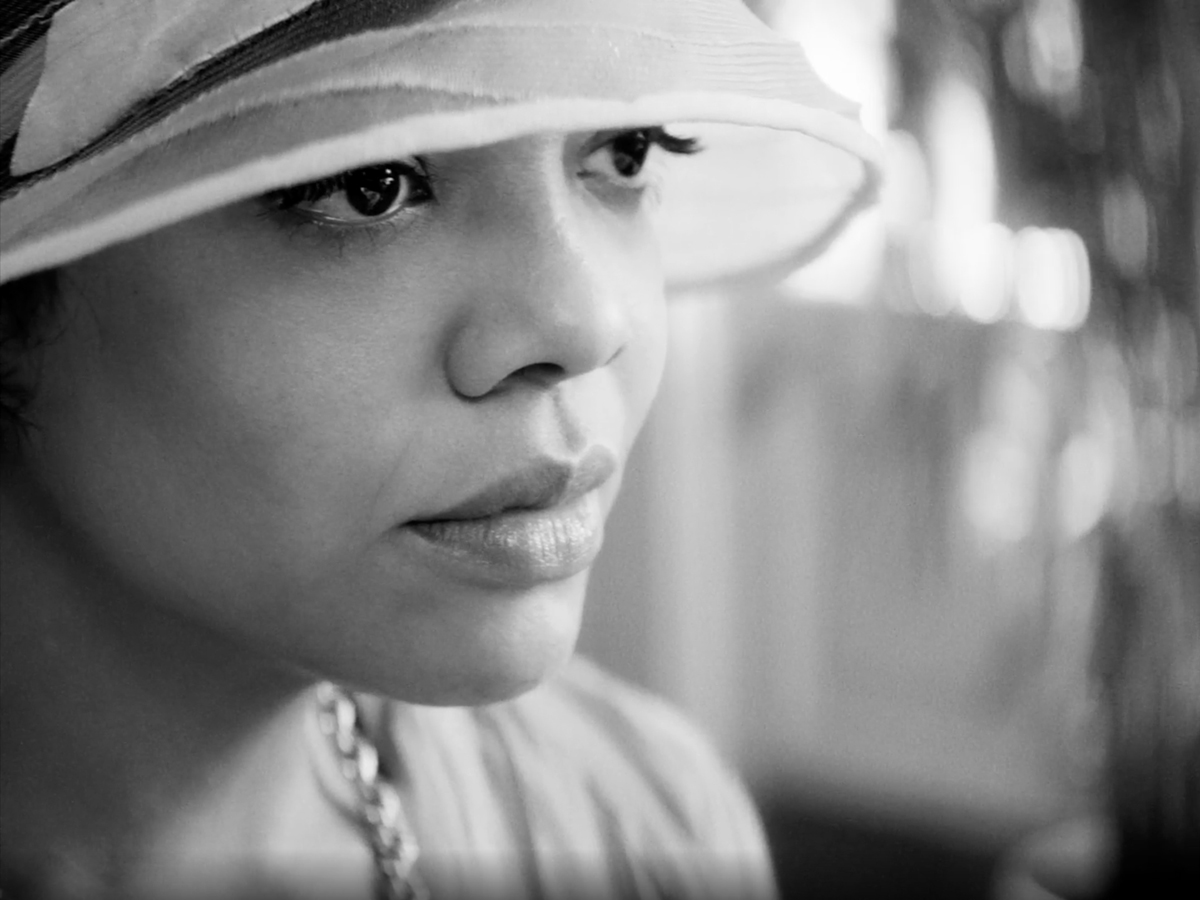
Tessa Thompson as Irene in Passing. Netflix © 2021.
Passing, directed by Rebecca Hall, who also adapted the screenplay from the 1929 novel of the same name by Nella Larsen, is a story of erstwhile friends reacquainting: two girls from Harlem, Irene Redfield (Tessa Thompson) and Clare Bellew (Ruth Negga). (No longer about two South Side Chicago exiles, the film is a thoroughly New York story, and I’ll forgive the petty betrayal.) Since last they parted in late girlhood, much has changed. Irene is now married and the mother of two boys. Clare became white—she married white, has a white daughter and money to match. She is passing, as stated several times in Hall’s script—more than is said plainly within the novel—a black girl living as a white woman. But then, so, too, is Irene, if only for the afternoon of their chance meeting. Yet there is a difference. “Avocational passing was lighthearted,” Margo Jefferson writes in her 2015 memoir, Negroland. “Passing-for-life stories were melodrama prompts.”
Some time elapses. In Passing, seasons are a minor thing, shifts in environmental dressing—leaves and wet pavement, snow—best observed in repeating shots of Irene’s returns to her home in Harlem, among the brownstones. Clare, the doll-eyed blonde with that smile, poses the greater weather. She gusts into the Redfields’ lives with thirst and an inconvenient charm, as well as disquieting beauty. The Bellews have relocated to New York from Chicago, Irene learns by the postmarked envelope of a letter first left unopened, then unanswered. She is through with Clare, yes, that’s right, what could, after all, come of all this? Irene is disturbed by their reencounter, though perhaps not honest with herself, or her husband, about why that is. (She claims offense in light of Mr. Bellew’s crass prejudice.)
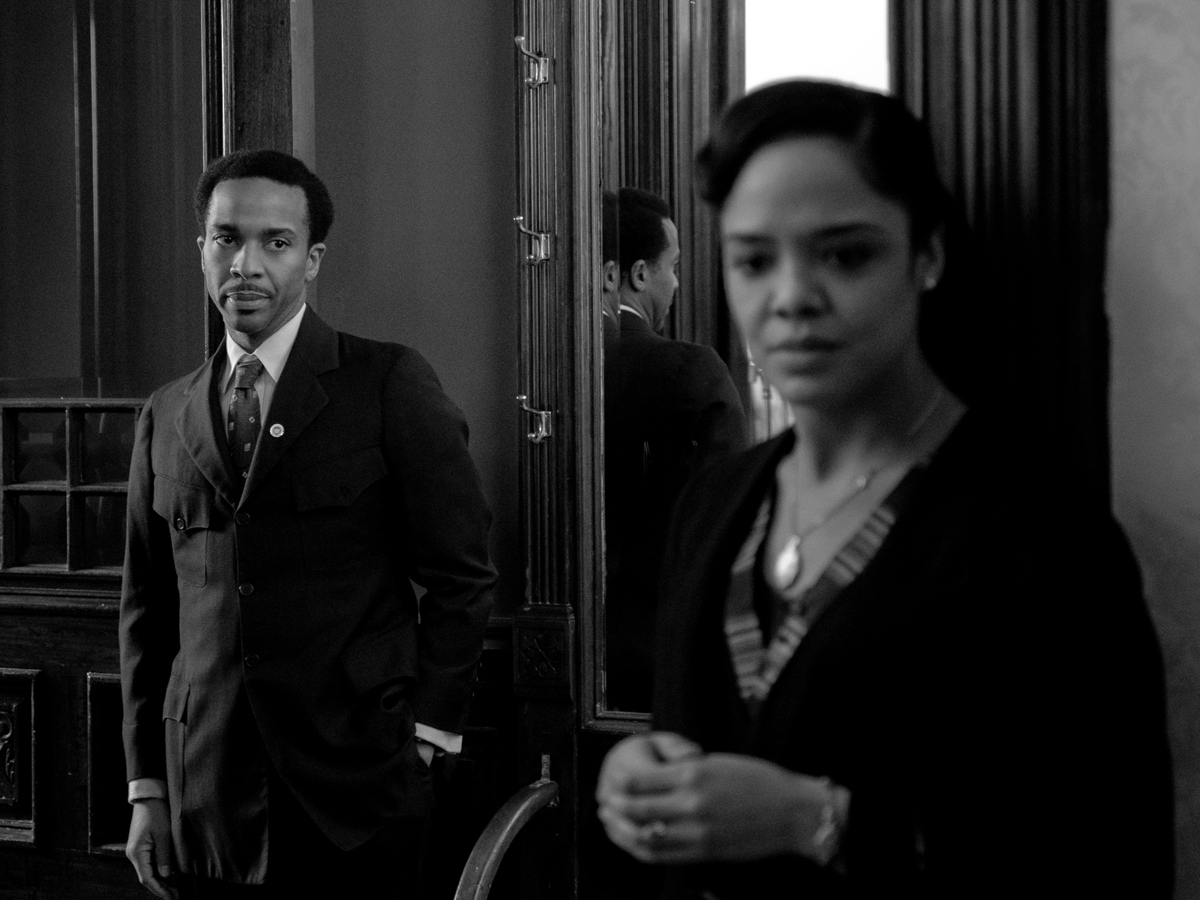
André Holland as Brian and Tessa Thompson as Irene in Passing. Photo: Emily V. Aragones. Netflix © 2021.
And yet, tucked into her marriage bed, Irene takes up for the girl she once knew. “Don’t mock her,” she tells her physician husband, Brian (André Holland). “That’s not fair.” When Clare shows up in Irene’s sitting room, rehearsed and beautiful in her hurt, her dear “Reenie” can’t help but indulge the petulance and play the doting partner in this scene. Negga gives the better performance, letting her chatterbox character speak most strikingly through body language: languorous poses, a turn of the head. Thompson, admittedly in the staider part, seems not quite rooted in the role, and that insecurity dampens the passions, even repressed ones, in Negga’s proximity. (Thompson spars better with the men, whose characters’ urges are managed, mothered.) It’s not an incorrect interpretation that Irene, in fact, is “cold” and “hard”—words that she uses to define Clare. But Hall and cinematographer Eduard Grau impart that which lies behind comportment—attraction. The camera, as Irene, holds Negga’s stares, sliding up her body, catching those slow smiles.
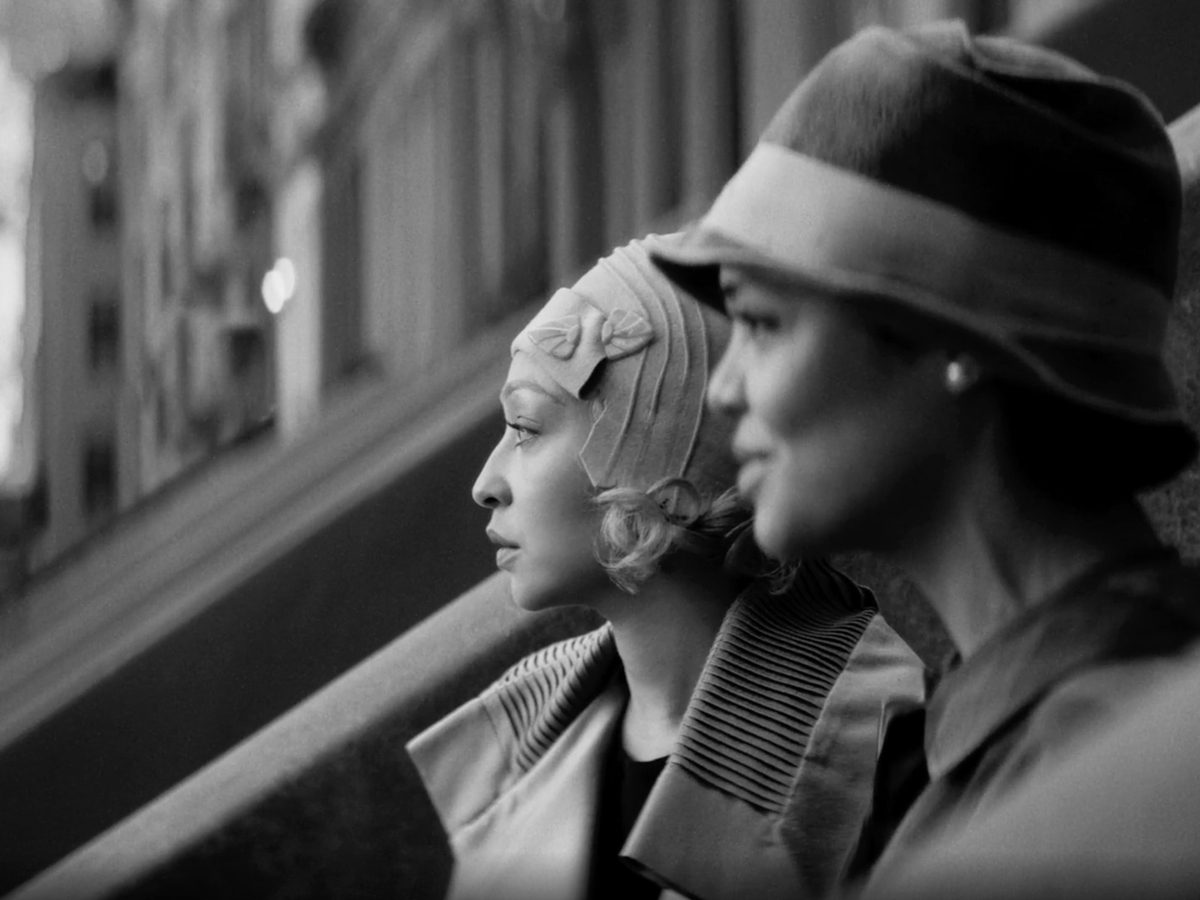
Ruth Negga as Clare and Tessa Thompson as Irene in Passing. Netflix © 2021.
Shooting in black and white lends its own sensuality, though the darkest darks are still muted, landing as shades of gray. Hall and Grau chose wisely. Contemporary audiences, jaded by the byzantine convolutions of the twenty-first-century race problem, would turn their noses up at the supposition that two well-known black actresses could pass for white in this century or the last, as though the maintenance of a color line isn’t one of America’s flightier pastimes. As fiction by William Wells Brown (Clotel), Mark Twain (Pudd’nhead Wilson), and Danzy Senna (Caucasia) exhibits, passing is as much a matter of what’s happening around a body as what appears visually, as surface. That is, it’s not all about color, not exactly. At the Drayton, Clare’s husband, John (Alexander Skarsgård), bursts in on the women with his first line, “Nig!” (Irene, conscious of the bona fide white in her midst, anxiously touches the back of her neck.) Clare, in twinkling amusement, coaxes John to explain that pet name, one inspired by his wife’s progressively darkening complexion. But it’s no matter, the proud bigot asserts: “You can turn as black as you please, as far as I’m concerned. I know you’re not colored.” This black-and-white film doesn’t evade tonal differences on the skin, but rather smartly minimizes their relevance. At a party, a mixed-race crowd ripples as a darkened bunch of shapes that recalls a passage from Larsen’s first novel, Quicksand: “Black figures, white figures, little forms, big forms, small groups, large groups . . . It was gay, grotesque, and a little weird.”
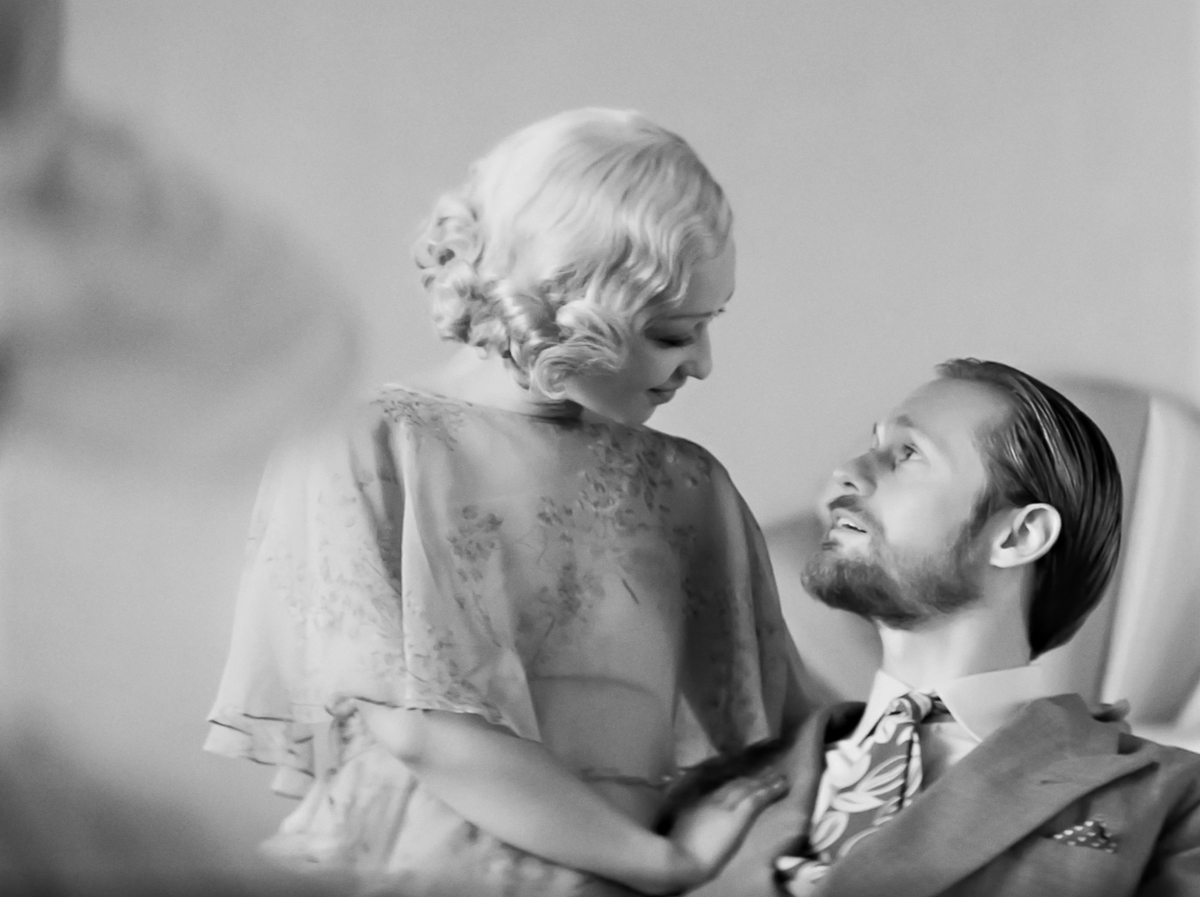
Ruth Negga as Clare and Alexander Skarsgård as John in Passing. Netflix © 2021.
There’s something stagelike about the multistory Harlem home Irene presides over, her life’s province. Transitions between the same old, same old are announced by a tinkling piano, part of Devonté Hynes’s prim score. Malaise, Larsen and Hall bear in mind, is not a condition unique to white women. Both Clare and Irene have made out well in their marriages, though that’s scarcely an index of happiness; both are restless, discontent. The Redfields can afford for Irene’s charity work to remain unremunerated; rarely does a scene take place inside their brownstone without a glimpse of their help in the form of a woman named Zulena (Ashley Ware Jenkins), with whom Irene takes the well-oiled tone of a benevolent mistress. Holland is good as a reproving husband—perhaps too good. I could have stood to have him a little less in the frame. The would-be third in this romantic triangle should only be, after all, a trifle. A conduit. In Hall’s adaptation, though, he assumes too much significance. At a final, fateful party, Brian and Clare titter their way up a six-story walkup while Irene looks on from behind—there’s envy directed above, though by this point it’s too clearly defined. That lack of mystery becomes too significant in the end, but I hope at least some portion of the audience will let themselves wonder.
Lauren Michele Jackson is an assistant professor of English at Northwestern University. She is the author of White Negroes.